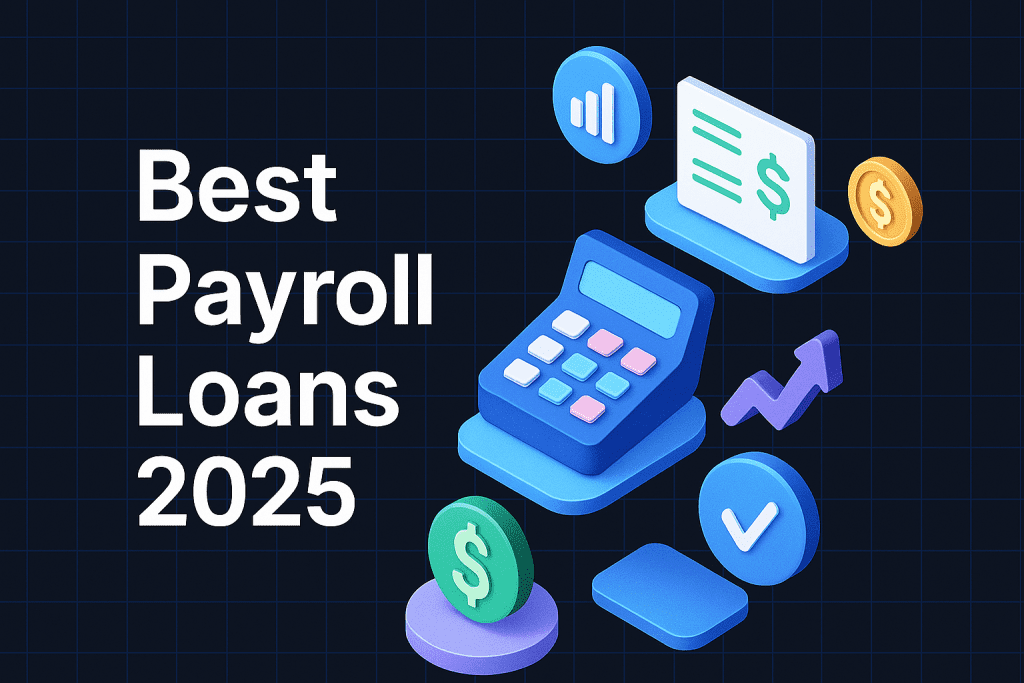Payroll loans are a crucial financial tool for small businesses and startups needing quick capital to cover employee wages during cash flow gaps. In 2025, as economic conditions and lending standards evolve, choosing the right payroll loan provider is more important than ever.
This guide breaks down the best payroll loan options in 2025, compares key features, and helps you make the smartest choice for your business.
Key Takeaways:
- Payroll loans offer fast access to capital specifically for covering employee wages.
- Ideal for small businesses facing short-term cash flow issues.
- In 2025, online lenders are increasingly dominating the market with flexible, fast solutions.
- Key factors to consider: loan amount, interest rate, funding speed, repayment terms, and eligibility requirements.
What Are Payroll Loans?
Payroll loans are short-term financing solutions specifically designed to help businesses cover their payroll expenses when cash flow is tight. Unlike general-purpose business loans, payroll loans are earmarked for employee compensation, including wages, taxes, and benefits.
Common Use Cases:
- Delayed client payments impacting cash flow
- Seasonal downturns or unexpected sales slumps
- Emergency situations requiring immediate payroll fulfillment
These loans help ensure employee retention and compliance with labor laws, reducing the risk of delayed payments and operational disruptions.
Who Should Consider a Payroll Loan in 2025?
While any business facing a payroll shortfall can benefit from a payroll loan, these are especially useful for:
- Small business owners and startups with unpredictable revenue
- Seasonal businesses like tourism, hospitality, and retail
- Tech startups or early-stage companies waiting on investor capital
- Service-based businesses with slow-paying clients
If you’re worried about meeting your next payroll run or want to avoid damaging your employee trust, a payroll loan can serve as a temporary financial bridge.
Top Payroll Loan Providers in 2025
OnDeck
- Best for fast funding
- Loan Amounts: Up to $250,000
- Terms: 3 to 24 months
- Interest Rates: Starting at 29.9% APR
- Funding Speed: As fast as same day
- Pros: Fast approval, great for urgent payroll needs
- Cons: Higher interest rates than some competitors
Bluevine
- Best for flexible lines of credit
- Credit Lines: Up to $250,000
- Repayment Terms: Weekly
- Interest Rates: Starting at 6.2%
- Pros: Ongoing access to capital, good for recurring payroll
- Cons: Weekly repayments may be tough for some businesses
Lendio
- Best loan marketplace
- Loan Amounts: $1,000 to $500,000
- Model: Aggregator platform that matches you with lenders
- Pros: Multiple loan offers, competitive options
- Cons: You still deal with third-party lenders
Fundbox
- Best for businesses with low credit
- Credit Lines: Up to $150,000
- Approval Speed: Fast (within minutes in some cases)
- Pros: Low credit score requirements, no prepayment penalties
- Cons: Smaller maximum loan amounts
PayPal Working Capital
- Best for PayPal users
- Loan Amounts: Based on PayPal sales volume
- Repayment: Automatic deductions from PayPal sales
- Pros: No credit check, transparent flat fee
- Cons: Only available to PayPal Business account holders
Comparison Table: Best Payroll Loan Providers 2025
| Provider | Loan Amount | Interest Rate | Funding Speed | Best For |
|---|---|---|---|---|
| OnDeck | Up to $250,000 | From 29.9% APR | Same day | Fast funding |
| Bluevine | Up to $250,000 | From 6.2% | 24-48 hours | Flexible credit lines |
| Lendio | $1,000 to $500,000 | Varies by lender | 1–3 days | Loan marketplace |
| Fundbox | Up to $150,000 | Varies | Same day | Low credit score borrowers |
| PayPal Working Cap | Based on sales | Flat fee model | Within minutes | PayPal users |
How to Qualify for a Payroll Loan
To qualify for a payroll loan, it’s essential to understand the various criteria lenders evaluate to determine your eligibility. Here’s a more detailed look at each factor:
Credit Score
Your credit score is a critical component in the approval process. While many lenders are willing to work with scores as low as 600, a higher score can improve your chances of securing better terms and interest rates. It’s advisable to check your credit report for any discrepancies and address them before applying for a loan.
Time in Business
Lenders typically prefer businesses that have been operational for at least six months to a year. This requirement demonstrates stability and the potential for ongoing revenue generation. Startups may find it more challenging to qualify, but some lenders specialize in financing newer businesses.
Revenue
Lenders set minimum monthly or annual revenue thresholds to ensure that your business generates enough income to repay the loan. This threshold varies by lender, but demonstrating consistent cash flow can significantly enhance your application. Be prepared to provide financial statements that clearly outline your revenue streams.
Bank Statements and Payroll Records
Providing recent bank statements and payroll records helps lenders assess your financial health and the regularity of your income. These documents offer insight into your business’s cash flow, helping lenders gauge your ability to manage loan repayments alongside other financial obligations.
Business Tax Returns
For larger loans, lenders often require business tax returns to verify your income and assess your financial stability over time. These returns provide a comprehensive view of your business’s financial performance, helping lenders make informed decisions about your loan application.
Additional Considerations
- Background Check: Lenders may conduct a background check on the business owner to evaluate any past financial or legal issues that could impact loan repayment.
- Current Liabilities: Your existing debts and financial obligations are assessed to ensure that taking on additional debt won’t overextend your business financially.
By understanding and preparing for these requirements, you can enhance your chances of qualifying for a payroll loan. It’s beneficial to gather all necessary documentation and consider consulting with a financial advisor to strengthen your application.
Pros and Cons of Payroll Loans
Pros:
- Fast access to funds
- Helps retain staff and avoid layoffs
- Easy online applications
- Can stabilize a business during tough times
Cons:
- High interest rates for lower credit scores
- Short repayment terms can strain cash flow
- Some lenders charge origination or service fees
Alternatives to Payroll Loans
Exploring alternatives to payroll loans can provide your business with the financial flexibility it needs. Here’s a closer look at each option:
Business Lines of Credit
A business line of credit offers flexible, reusable capital that you can draw from as needed, similar to a credit card. This option is ideal for managing cash flow fluctuations or unexpected expenses. You only pay interest on the amount you use, and once you repay it, the funds become available again. This flexibility makes it a popular choice for businesses seeking ongoing access to funds without the commitment of a lump-sum loan.
Invoice Factoring
Invoice factoring involves selling your unpaid invoices to a factoring company in exchange for immediate cash. This option is beneficial for businesses with outstanding receivables that need quick access to funds. The factoring company advances you a percentage of the invoice value and collects payment directly from your customers. While this can provide fast cash, it’s important to consider the fees involved and how it might affect customer relationships.
Merchant Cash Advances
A merchant cash advance (MCA) provides a lump sum of cash in exchange for a percentage of your future credit card sales. While MCAs offer easy approval and fast funding, they come with high costs and fees. This option is suitable for businesses with strong credit card sales that need immediate cash flow but should be approached with caution due to the potential financial strain from high repayment rates.
SBA Loans
Small Business Administration (SBA) loans are known for their affordable interest rates and favorable terms. They are partially guaranteed by the government, which reduces the risk for lenders. However, the application process can be lengthy and requires thorough documentation. SBA loans are ideal for businesses that can afford to wait for funding and need a long-term financing solution with lower interest rates.
Local and Federal Grants
Grants from local and federal sources can provide free money for payroll relief without the need for repayment.
These grants are often competitive and may require you to meet specific criteria or use the funds for designated purposes. Researching available grants and understanding their application processes can be time-consuming, but the potential benefits make them a worthwhile consideration for eligible businesses.
By evaluating these alternatives, you can choose the financial solution that best aligns with your business needs and goals. Each option has its advantages and considerations, so it’s important to assess your financial situation and consult with a financial advisor if necessary.
Tips for Choosing the Best Payroll Loan
- Know your payroll obligations: Calculate upcoming wage bills
- Compare multiple lenders: Don’t settle for the first offer
- Watch for hidden fees: Check for origination, servicing, and late fees
- Assess repayment structure: Make sure your cash flow can support it
- Evaluate lender reputation: Read online reviews and Better Business Bureau ratings
How to Use a Payroll Loan Responsibly
- Only borrow what you need
- Use loan strictly for payroll (not other business expenses)
- Communicate openly with employees if facing delays
- Set a repayment plan in advance
- Reassess your business cash flow strategy
Conclusion
Payroll loans can be a lifesaver for businesses navigating short-term cash flow issues. In 2025, with more digital lending options and higher competition, finding a loan that suits your business needs is easier than ever.
Just be sure to understand your obligations and choose wisely. With proper planning and responsible use, payroll loans can keep your team paid and your business on track.
Read Next:
Frequently Asked Questions (FAQ)
Q1: What is the average interest rate for payroll loans in 2025?
A: Rates vary, but most range from 6% to 40% depending on the lender and your creditworthiness.
Q2: Can startups with no revenue qualify for a payroll loan?
A: Some lenders specialize in helping early-stage businesses, but expect to show alternative forms of financial backing or personal guarantees.
Q3: How quickly can I get funding from a payroll loan?
A: Many online lenders offer same-day or next-day funding.
Q4: Will taking out a payroll loan hurt my credit?
A: It depends on the lender’s policy—some do soft credit pulls, others hard. Missing payments will affect your score.
Q5: Is a payroll loan the best option for emergency funding?
A: It’s great for meeting payroll needs, but compare it with business credit cards, lines of credit, or local grants depending on your situation.
Q6: Are payroll loans forgivable like PPP loans were?
A: No. As of 2025, most payroll loans are not forgivable and must be repaid according to the loan terms.
Q7: Can I use a payroll loan for other expenses?
A: Some lenders allow flexibility, but most loans are intended specifically for covering payroll.

